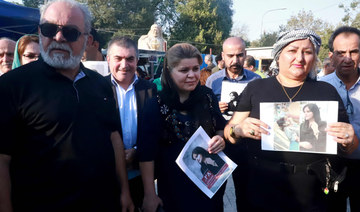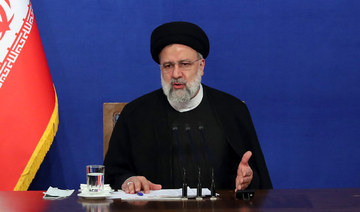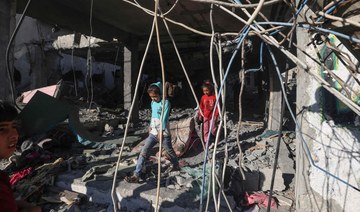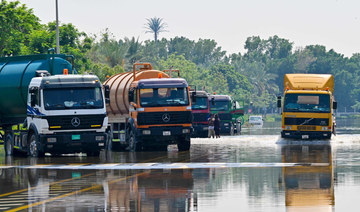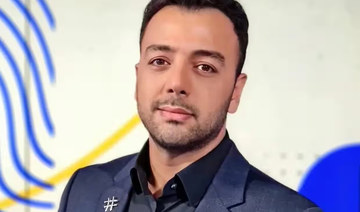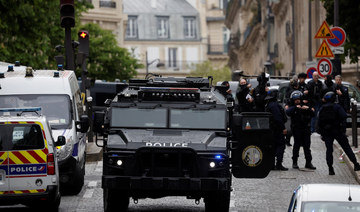NEW YORK CITY: As Iran is rocked by furious nationwide protests following the death on Friday of Mahsa Amini — a 22-year-old Iranian woman who died after police beat her for “improperly” wearing the hijab — President Ebrahim Raisi might have hoped to escape the anger swelling in his country while he attends the UN General Assembly in New York this week.
But he faces the threat of being served with a lawsuit in the city by Iranian dissidents and Westerners who were held hostage by the regime in Tehran and accuse him of personal involvement in the torture and mistreatment they endured.
The lawsuit, which is supported by the National Union for Democracy in Iran, is being filed in the Southern District of New York by human rights attorney Shahin Milani on behalf of victims of Raisi’s alleged crimes.
The plaintiffs claim they endured acts of torture that were either directly ordered or substantially assisted by Raisi, which means the Iranian president is liable to face a civil lawsuit under the US Torture Victim Protection Act.
Cameron Khansarinia, NUFDI’s policy director, introduced the plaintiffs during a press conference at a private club in midtown Manhattan.
“We are here today to announce and outline in detail an historic, federal, civil lawsuit against Ebrahim Raisi,” he said.
“The plaintiffs in this case — Iranian dissidents, former Iranian hostages, former Western hostages — are coming together in unprecedented fashion to take a step forward for justice.”
On the sidelines of the UN General Assembly, Khansarinia told Arab News: “Raisi is in New York and it’s important that while the media is covering him, they’re also covering his victims.
“We want to have it recorded in the US judiciary that Ebrahim Raisi’s victims are standing up to him, that he is a criminal, that he is being accused, and in our view is guilty, of torture. This is important for setting a new legal precedent for such cases.
“Secondly, we are giving a voice to the Iranian people and to his victims, and allowing them for the first time to speak up because for so long they have been silenced by the regime and, unfortunately, often even by those in the West, so it’s an important opportunity for them to speak their truth today.”
During the press briefing, which was also supported by the NUFDI, four of those victims shared the details of their experiences at the hands of the Iranian regime: Mehdi Hajati, a city councilor and dissident; Kylie Moore-Gilbert, a British-Australian academic and former hostage of the regime; Hamid Babaei, a Belgian-Iranian academic and former hostage; and Ahmad Batebi, a former political prisoner.
They were joined by Navid Mohebbi, who was once the youngest journalist in the world in detention when he was imprisoned by the regime in Tehran. Milani, the lead attorney in the lawsuit, stressed that the civil case directly targets Raisi personally and not the Islamic Republic of Iran as a whole.
Moore-Gilbert described years of “gross mistreatment” and “psychological and physical torture” while in detention. Raisi was head of Iran’s judiciary when she was convicted, sentenced, denied an appeal, and transferred to prison. She said she holds him “ultimately responsible for the mistreatment and injustice” she endured.
She said that the judge at her trial was “clearly a puppet” of the government and not “capable of making independent decisions.” She was not even aware she had a lawyer until a couple of weeks before her hearings, she added.
Moore-Gilbert, speaking via video link, said she was “unable to present evidence during the trial” and could not understand the proceedings because they were conducted entirely in Farsi. She was sentenced to 10 years in prison on “ludicrous charges” of espionage. She was immediately placed in solitary confinement for seven months, one of the many examples of cruel and unjust punishment she said she endured, which also included exposure to infectious diseases and denial of medical care.
“He is ultimately responsible for my mistreatment,” Moore-Gilbert said of Raisi, adding: “I am taking part in this lawsuit under the TVPA in order to hold Raisi accountable for one injustice: My own.”
Babaei, another academic unjustly imprisoned in Iran, described the repulsive conditions he endured during his time in detention, revealing that inmates were not even provided with cups for drinking water.
“I lived in a constant trauma,” he said as he told how he saw fellow prisoners being taken away to be hanged, which he said kept him in a continuous state of fear that he would be next.
Mohebbi said that Iranians have been “exposed to continuous trauma over the last 43 years.”
Describing his experiences in prison, he said the entire judiciary system, in which “the punishment of a defender is already sealed,” had conspired against him.
He said: “With this lawsuit, the survivors and victims of the regime send a very clear message to the butchers of Tehran that you will never break our soul, our resilience, and our fight for our human dignity is not one that we will lose.”
The lawsuit brings three cases to the court, he added, but they “represent thousands of Iranians whose rights to express justice, their rights to express themselves, and their rights to express their suffering has been taken away.”
Marjam Keypour Greenblatt, a human rights activist and non-resident scholar at the Middle East Institute, told Arab News: “I am here to support the rights of Iranian people who are having their rights violated by the regime on a regular basis. I am here to echo their voices and to make sure there is justice where justice is rarely seen.”
Justice is the ultimate goal of the civil case against Raisi but success in achieving this justice, which thousands of others have been denied, could be a difficult prospect.
Gissou Nia, director of the Atlantic Council’s Strategic Litigation Project, told Arab News that the TVPA is “the right act to use here because you can seek remedies for crimes that were committed elsewhere.”
She added: “The legal team wants to serve process but provided that he is served then there would be determinations around immunity. With this particular matter, if the defendant was a head of government from France or Germany (for example), then the court would most likely take judicial notice and say that Raisi is protected by head-of-state immunity.
“But because it’s Iran, and under US law there are some different exceptions to state immunity as it applies to Iran, the court may opt to ask the State Department for their view. This could take a while but there is a chance that the suit moves forward.”
Raisi is not obliged to respond to a civil lawsuit, however, and if he chooses not to engage with the legal proceedings the court could issue a default ruling against him and in favor of the plaintiffs.
The president is not a member of Iran’s permanent mission to the UN and therefore does not qualify for diplomatic immunity. However he is afforded protection from being served with legal papers while he is in the UN headquarters and the surrounding district, and while traveling between there and his accommodation. However, the legal papers could be served against him if his accommodation in New York, or any non-official activities he takes part in, are outside the borders of the UN district.
Nizar Zakka, a former prisoner of the Iranian regime, told Arab News: “The most important part of this lawsuit is that the Iranian regime needs to know that they will be hunted wherever they go (and) they will be sued until they stop these activities, like hostage-taking, that they have been doing since 1979.”
For those dissident Iranians and Western hostages who continue to endure physical and psychological trauma after years of unjust confinement, that hunt continues this week in New York City.
Iranian dissidents, former hostages of regime launch lawsuit against Raisi
https://arab.news/g2pej
Iranian dissidents, former hostages of regime launch lawsuit against Raisi

- Activists call for justice in a US federal civil case against President Ebrahim Raisi, who is in New York this week for the UN General Assembly
- ‘I have lived in constant trauma,’ said one victim of unjust detention and torture who saw fellow prisoners taken to be hanged and feared he would be next
Palestinians to reconsider US ties after veto of bid for full UN membership, Abbas says
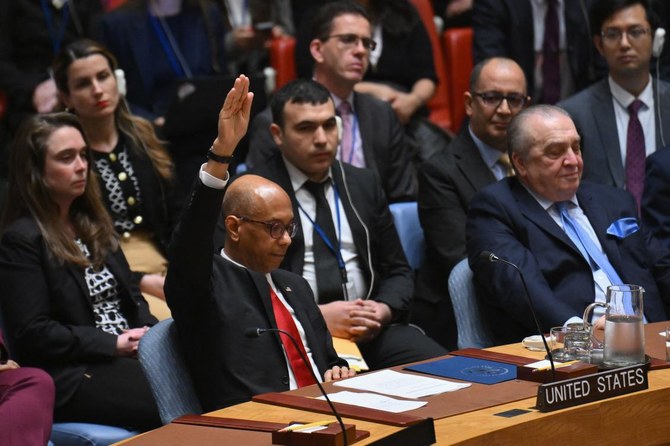
CAIRO: The Palestinian Authority will reconsider bilateral relations with the US after Washington vetoed a Palestinian request for full United Nations membership, President Mahmoud Abbas said in an interview with the official WAFA news agency.
Israel says its forces kill 10 militants in West Bank raid

- “Security forces eliminated 10 terrorists during encounters” over more than 40 hours, the army said
- Eight soldiers and a police officer had been injured in the raid
TULKARM, Palestinian Territories: The Israeli army said Saturday that its security forces killed 10 militants in an ongoing raid around Nur Shams, a refugee camp in the north of the occupied West Bank.
“Security forces eliminated 10 terrorists during encounters” over more than 40 hours, the army said in a statement.
The army said eight soldiers and a police officer had been injured in the raid.
An AFP journalist in nearby Tulkarem heard gunshots and blasts coming from Nur Shams on Saturday.
Residents contacted by AFP said there was a power outage and food was running short in the camp, saying nobody was allowed to enter or leave.
Since early last year violence has flared across the West Bank, which Israel has occupied since 1967. The violence has further escalated since the war in Gaza broke out on October 7.
Israeli forces say their frequent raids in the West Bank target Palestinian militants, but civilians are often among the dead.
Around 480 Palestinians have been killed by Israeli troops or settlers in the West Bank since the Hamas assault on Israel triggered the Gaza war, according to Palestinian official sources.
Emirates and flydubai resume normal operations after Dubai floods
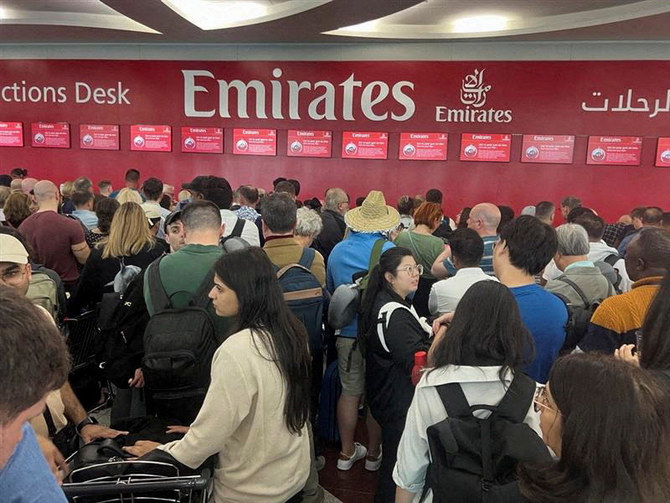
- Emirates canceled nearly 400 flights and delayed many more as a result of a record storm that hit the desert city of Dubai
RIYADH: Dubai’s flagship carrier Emirates and sister airline flydubai have restored normal operations after heavy rains caused severe flooding across the United Arab Emirates earlier this week, the airlines said on Saturday.
Emirates canceled nearly 400 flights and delayed many more as a result of a record storm that hit the desert city of Dubai on Tuesday, said a statement released by the airline’s president, Tim Clark.
Due to the impact of the storm, the airline suspended check-in for passengers departing from Dubai and halted its transit operations through Dubai International Airport, a major global travel hub, leaving thousands of travelers stranded.
The airport has struggled to return to normal operations after the storm flooded taxiways, forcing flight diversions, delays and cancelations.
Flydubai also returned to its full flight schedule from the airport’s Terminal 2 and Terminal 3 on Saturday following the weather-related disruption, a spokesperson for the airline said.
Clark said Emirates had provided 12,000 hotel rooms and 250,000 meal vouchers to customers who were affected. He added it would take days to clear the backlog of rebooked passengers.
The UAE has suffered the impact of the flooding for days, with roads between the city and Abu Dhabi still partially under water as of Saturday. In Abu Dhabi, some supermarkets and restaurants faced product shortages, unable to receive deliveries from Dubai.
Researchers have linked extreme weather events such as Tuesday’s storm to climate change and anticipate that global warming will lead to higher temperatures, increased humidity and a greater risk of flooding in parts of the Gulf region.
A lack of drainage infrastructure to cope with heavy rains in countries such as the UAE can put them at particular risk of flooding.
Israeli airstrike in Rafah kills at least 9 Palestinians, including 6 children
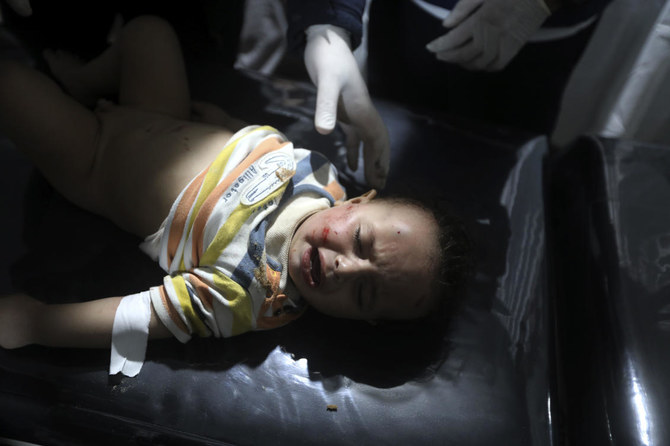
- Strike late Friday hit a residential building in the western Tel Sultan neighborhood of the city of Rafah
RAFAH, Gaza Strip: An Israeli airstrike on a house in Gaza’s southernmost city killed at least nine people, six of them children, hospital authorities said Saturday, as Israel pursued its nearly seven-month offensive in the besieged Palestinian territory.
Israel’s war against the Islamic militant group Hamas has led to a dramatic escalation of tensions in an already volatile Middle East.
The strike late Friday hit a residential building in the western Tel Sultan neighborhood of the city of Rafah, according to Gaza’s civil defense. The bodies of the six children, two women and a man were taken to Rafah’s Abu Yousef Al-Najjar hospital, the hospital’s records showed.
At the hospital, relatives cried and hugged the bodies of the children, wrapped in white shrouds, as others comforted them.
The fatalities included Abdel-Fattah Sobhi Radwan, his wife Najlaa Ahmed Aweidah and their three children, his brother-in-law Ahmed Barhoum said. Barhoum also lost his wife, Rawan Radwan, and their 5-year-old daughter Alaa.
“This is a world devoid of all human values and morals,” Barhoum told The Associated Press Saturday morning, crying as he cradled and gently rocked the body of Alaa in his arms. “They bombed a house full of displaced people, women and children. There were no martyrs but women and children.”
No victims were registered from a second overnight strike in the city.
Rafah, which lies on the border with Egypt, currently hosts more than half of Gaza’s total population of about 2.3 million people, the vast majority of whom have been displaced by fighting further north in the territory.
Despite calls for restraint from the international community, including Israel’s staunchest ally, the United States, the Israeli government has insisted for months that it intends to push a ground offensive into the city, where it says many of the remaining Hamas militants are holed up.
Such a ground operation has not materialized so far, but the Israeli military has repeatedly carried out airstrikes on and around the city.
The war was sparked by an unprecedented raid into southern Israel by Hamas and other militant groups on Oct. 7 that left about 1,200 people dead, the vast majority of them civilians, and saw about 250 people kidnapped and taken into Gaza. Israel says about 130 hostages remain in Gaza, although more than 30 have been confirmed to now be dead, either killed on Oct. 7 or having died in captivity.
The Gaza Health Ministry said Saturday the bodies of 37 people killed by Israeli strikes were brought to hospitals in Gaza over the past 24 hours. Hospitals also received 68 wounded, it said. The latest figures bring the overall Palestinian death toll from the Israel-Hamas war to at least 34,049, and the number of wounded to 76,901, the ministry said. Although the Hamas-run health authorities do not differentiate between combatants and civilians in their count, they say at least two thirds have been children and women.
The war has sent regional tensions spiraling, leading to a dramatic eruption of violence between Israel and its archenemy Iran that threatened to escalate into a full-blown war.
On Friday, both Iran and Israel played down an apparent Israeli airstrike near a major air base and nuclear site in central Iran, indicating the two sides were pulling back from what could have become an all-out conflict. Over the past several weeks, an alleged Israeli strike killed two Iranian generals at an Iranian consulate in Syria and was followed by an unprecedented Iranian missile barrage on Israel.
Israel has also faced off with the Hezbollah militant group, an Iranian proxy operating from Lebanon, with the two sides there frequently trading rocket and drone attacks across the Lebanese-Israeli border. Yemen’s Iran-backed Houthi rebels have also joined the fray, launching strikes against merchant ships in the Red Sea and the Gulf of Aden in what they say is a campaign of solidarity with the Palestinians in Gaza.
Tension has also been high in the occupied West Bank, where an Israeli military raid Friday in the Nur Shams refugee camp killed at least four Palestinians, including three militants, according to the Israeli military, Palestinian health officials and a militant group.
Palestinian health authorities said one of those killed was a 15-year-old boy shot dead by Israeli fire. The Islamic Jihad militant group confirmed the deaths of three members, including one who it said was a local military commander. The Israeli military said four Israeli soldiers were slightly wounded in the operation.
Saraya Al-Quds, the military arm of Islamic Jihad, said its fighters had engaged in heavy gunbattles Saturday morning with Israeli forces in the town of Tulkarem, adjacent to Nur Shams. No further details were immediately available. Residents in Tulkarem went went on a general strike Saturday to protest the attack on Nur Shams, with shops, restaurants and government offices all closed.
Since the Oct. 7 Hamas attack on southern Israel, more than 460 Palestinians have been killed by Israeli fire in the West Bank, Palestinian health officials say. Israel stages frequent raids into towns and cities in the volatile territory. The dead have included militants, but also stone-throwers and bystanders. Some have also been killed in attacks by Israeli settlers.
Iran FM downplays reported Israeli retaliation

- Israeli officials have made no public comment on what happened Friday
- Overnight last Saturday-Sunday Iran launched its first-ever direct attack on Israeli territory
Tehran: Iran’s foreign minister has dismissed as akin to child’s play the reported Israeli retaliation for an unprecedented Iranian strike, and said Tehran would not respond unless Iranian “interests” were targeted.
On Friday, Iran’s state media reported explosions were heard after, according to an official, small drones were successfully shot down.
Media in the United States quoted officials there as saying Israel had carried out strikes in retaliation for Tehran’s drone and missile barrage fired at Israel last weekend.
“What happened last night was no attack,” Foreign Minister Hossein Amir-Abdollahian told NBC News in a Friday interview.
“It was the flight of two or three quad-copters, which are at the level of toys that our children use in Iran.”
He added that, “As long as there is no new adventure on behalf of the Israeli regime against Iran’s interests, we will have no response.”
Friday’s explosions prompted world leaders to appeal for calm and de-escalation with fears of wider conflict against the backdrop of the war in Gaza which began on October 7.
Overnight last Saturday-Sunday Iran launched its first-ever direct attack on Israeli territory. The barrage was in response to a deadly April 1 air strike on Tehran’s consulate in Damascus, which Iran blamed on Israel.
The Israeli army said the vast majority of the more than 300 missiles and drones fired by Iran were shot down — with the help of the United States and other allies — and that the attack caused only minimal damage.
Israeli officials have made no public comment on what happened Friday, and analysts said both sides are looking to de-escalate, for now.
“If the Israeli regime intends to take another action against our interests, our next response will be immediate and to the maximum,” Amir-Abdollahian said in the interview.



